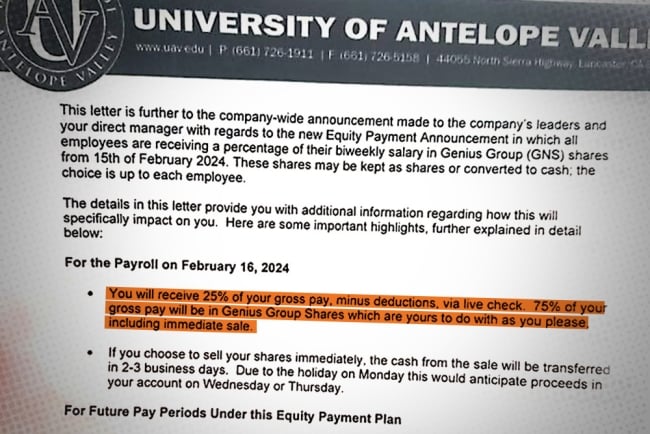You have /5 articles left.
Sign up for a free account or log in.

The University of Antelope Valley is giving employees the majority of their paychecks in stock from the college’s parent company.
A California university on probation with its accreditor is facing eviction, a shaky leadership lineup and allegations of withholding employee salaries, leaving questions swirling about its ability to survive.
The University of Antelope Valley, a four-year, for-profit institution, was placed on accreditation probation in August. Since then, the situation at the university has worsened, according to former and current employees who spoke on condition of anonymity.
Two former employees and one current employee described an environment of depleted morale, with students owed thousands of dollars, employees being paid partly in stock instead of salary and a looming eviction from dorms and classrooms later this month.
“I know some people on the brink of walking out and not going back due to the impact of their mental health, their families, their daily livelihoods,” a former employee told Inside Higher Ed. “It’s practically a hostage situation—they can’t look for other jobs because they haven’t been fully paid.”
UAV, in a statement to Inside Higher Ed Wednesday, said, “The university is facing a period of unprecedented challenges.”
“Our continued focus remains on the well-being of our students. We are committed to doing everything possible to honor our commitments to our students,” the statement said. “The university is in the process of identifying all options for our students to continue their studies either with UAV or another school. ”
In December, the Department of Education placed the university on heightened cash monitoring status, which includes oversight of financial or federal compliance issues.
UAV’s parent company, Singapore-based Genius Group, voiced concerns about the college’s viability last year. Those concerns were a red flag for UAV’s accrediting agency, the Western Association of Schools and Colleges Senior College and University Commission (WSCUC).
“UAV has not provided evidence that it has the leadership, organizational structures, and decision-making processes that can sustain institutional capacity and educational effectiveness,” WSCUC said in its August probation notice.
WSCUC, which visited the university in late January, told Inside Higher Ed in a statement Wednesday that it is aware of the current issues at UAV. The accreditor said it is actively involved with the university regarding specific accreditation requirements relating to student rights and information, change of location, changes in program delivery, and the issues mentioned in its probation letter, including its leadership and financial stability.
In December, UAV president and CEO Tracy West took a leave of absence after 14 months on the job with no formal explanation, according to UAV employees. UAV’s chief financial officer, Timothy Campagna, stepped into the role of interim CEO, and Cecilia Pineda, who worked for Genius Group, became interim CFO, according to WSCUC documents. Earlier, just two weeks before being placed on probation, the university announced an entirely new Board of Trustees.
“This whole time [the university is] trying to find little loopholes, and it never worked out in their favor,” a second former employee said.
The employees told Inside Higher Ed they reached their breaking point on Feb. 16, after receiving paychecks for 25 percent of their weekly hours, with the remaining compensation offered in stock for UAV’s parent company, Genius Group.
A UAV letter to employees, obtained by Inside Higher Ed, details the stock-option payments. “As discussed in the recent Town Hall, University of Antelope Valley has faced significant cash flow challenges recently due to heightened cash monitoring and the need to vacate campus,” the letter said.
“It was a very depressing, draining scene to be a part of,” the second former employee said.
The first employee told Inside Higher Ed they quit the day of the partial paychecks.
“I went through the five stages of grief over the three-day weekend,” that employee said. “I was sad. I was mad that they waited so long. This isn’t the first time they’ve done something last minute that had a huge impact on people’s livelihood, but it was the first time it affected everyone, including student employees.”
A third employee, who still works for UAV, remained at the university but turned down the stock options. That employee is unsure if they will receive their 25 percent of payment due to refusing the other 75 percent in stock options.
“When I asked if I was getting my 25 percent, I was told to reread the paper,” the current employee said. “I’m very stressed; I can’t sleep at night not knowing about pay. I can’t work for free.”
Adding additional uncertainty, UAV students and employees are in limbo this week as an eviction threat looms.
“Our students are still lost—they are emailing me, saying, ‘Am I doing this work?’” the current employee said. “The students are in a very weird spot because they don’t know what it means for their education.”
UAV spans multiple buildings, including a renovated hotel/motel it uses for classroom space and dormitory rooms. According to the three current and former employees and an additional current employee, UAV told students and employees it will be switching to an entirely remote teaching plan beginning Feb. 26, and any students in the dorm must move out by that date.
The plan is to return to in-person classes once buildings can be rented or bought. But whether the university makes it that long seems more unlikely, the employees said.
“My fear is they won’t be able to pay employees at all and keep working,” the second former employee said. “Until someone, somewhere, says, ‘You can’t be a business anymore.’”









